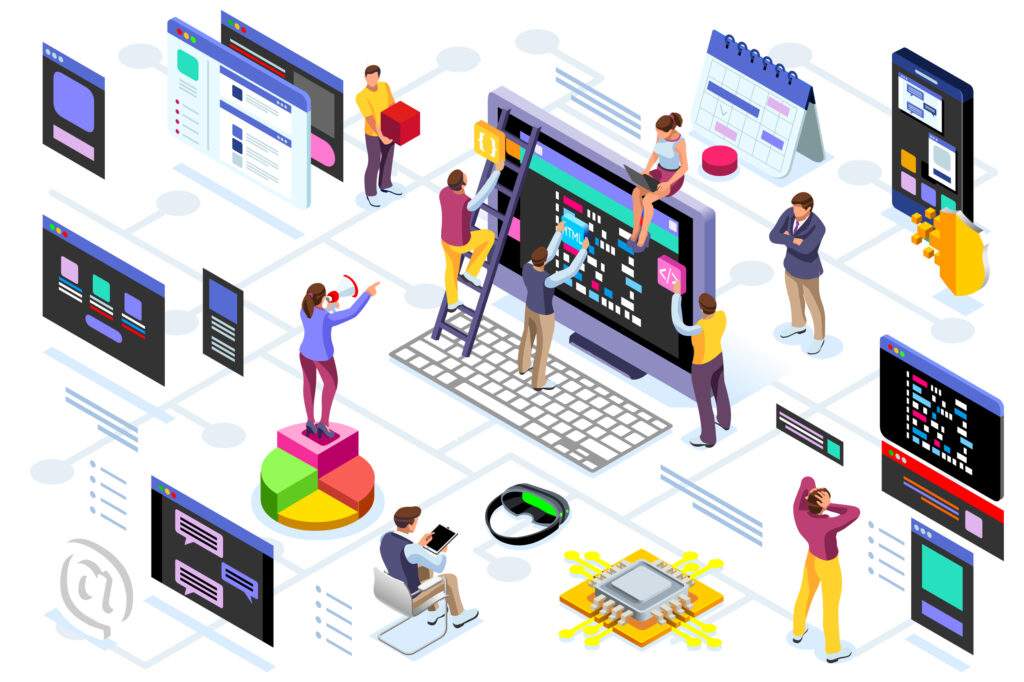Sales numbers and financial data: two great things that don’t always go great together. Both sets of information are essential to the success of any organization. That’s why most businesses purchase both accounting software and CRM software as separate solutions; they rarely integrate accounting and CRM software.

The problem? Those systems don’t always connect in the ways they should. And when they don’t, you risk a complete misunderstanding of your profit, efficiency, cost management, and much more.
For many growing businesses, accounting software solutions such as Quickbooks are the status quo. But with limited features when it comes to tracking, reporting, and transactions, many businesses find themselves looking for something more. This is where having the right ERP software can really make a difference.
Of all your organization’s data sets, matching sales with your accounting numbers is especially important because they are naturally prone to differences. If endless meetings and numbers comparisons sound neither thrilling nor possible, there’s a better way to do it.
The Importance of Integrating Accounting and CRM Software (With ERP Software)
Much like the cultural distinctions between sales and accounting departments, CRM and accounting software systems can be vastly different. Both are, at their core, databases. And though it should seem simple to transfer information from one database to another, it rarely is.
Putting aside the annoyance of constantly having to sign into other software applications and the potential for lost data, lacking accounting and CRM integration carries more dire implications.
Here are 6 opportunities, most of which are mission-critical, you might be missing without a properly integrated CRM and accounting software.
1) Recognizing Profit
Companies with unconnected software have a very difficult time seeing their profit. Consider this scenario: your sales team mistakenly interprets an influx of orders to mean profit. On the surface, it’s a logical interpretation. Customers are buying, and that must mean positive numbers for the organization.
But that’s not always the case. How can the sales team really know that the company is profitable?

In order to assess profitability, the sales team needs to be able to see expenses. It’s entirely possible that a recent influx of sales is the result of higher marketing spend. Without a centralized way of sharing data, there are too many potential blind spots among divisions.
Profitability issues work the other way, too. If the accounting department can’t see CRM data, they can’t know how many invoices should be generated from all of those new product orders the company received.
Your accounting and sales divisions will likely always see some measure of separation. But integrated software allows them to have conversations, when needed, based on shared internal data. That conversation is not just expedient. It’s also based on a singular understanding of what factors comprise profit and loss.
2) Process Efficiency
With separated accounting and CRM systems, many companies complain that their staff has to enter data multiple times just to make sure it’s present on all systems. That means at least doubling (but sometimes tripling) their efforts. It also means the organization increases its risk of input errors. The process of reviewing, finding, and fixing those data errors is time-consuming and chaotic.
By contrast, integrated solutions eliminate double-entry and limit the risk of errors. Of course, those errors may happen sometimes. But when they do, your staff will only have to correct them once. Not twice. Not four times.
This kind of inefficiency happens especially often to growing organizations. As their sales and financial data get more complex, processes become more difficult. It can be a gradual change, happening often without the company even noticing. That’s why integrated solutions allow companies to grow without sacrificing the integrity of their data.
3) Proper Cost Management
We live in the age of subscriptions. From television to food, we pay for more of what we use with recurring subscription charges. Software is no exception.

But with each new software solution your company subscribes to, you don’t just increase your recurring payables. You also increase training, maintenance, and efficiency costs. Those costs, of course, multiply with each new subscription.
It’s one thing to have software that helps you report on costs and expenses, but what about the costs and expenses for all those software solutions? Moving to a single, integrated solution will drastically cut your company’s subscription fees into one bill. Further, you’ll be able to leave behind the maintenance labor you once used on all of those systems to run reports, export data, etc.
4) Accuracy & Visibility
If your sales and accounting teams never interacted, how would orders move to invoices? How would you know when a customer needed a credit, or when to complete an order?
Of course, your teams do communicate. Just not always electronically. With a single business management software, your sales orders can automatically generate invoices— with no manual entry whatsoever.
But the questions go deeper than credits and invoices. Throughout your organization’s lifecycle, you’ll ask plenty of them. Should we renovate the office? Can we hire a new employee? Does it make sense to purchase a new fleet vehicle? Your answers to these questions depend on your assurance that you have the funds and financial stability to act accordingly.
5) Reporting Connectivity
Without fully integrated connections between sales and accounting, it becomes increasingly difficult to report on them without exporting into external spreadsheets. Lacking connectivity also compromises your reporting accuracy.
With a full business management solution, users can generate informative system reports can at any time. Imagine having the ability to view and compare data across divisions, without the struggle of using multiple spreadsheets and emails.
6) Audit Trail Accountability

Imagine having to track down which sales rep gets credit for an invoice because the sales orders are not connected within the same system.
Now picture how much communication time you’d lose outside of the system, trying to figure out which order matches the invoice, and then associating the sales rep to the invoice so that they get credit on the sale.
One last time: now think about being able to click two buttons inside of a single solution to see the same information. How much time would your organization save?
Conclusion: ERP Software Unifies Your Business
So far, I’ve said a lot about integrating accounting and CRM software. There are plenty of options out there, but the better ones won’t be separated. That goes for having two different products, but it also means not trying to connect modular solutions.
Even products that were developed by the same company may have vastly different development histories. One may have been acquired by the parent company, while the other may have been developed in-house.
Truly integrated solutions will be developed and supported by the same vendor, with the same standards and optimal connectivity. So make sure you do your research. If possible, involve your sales and accounting managers in your software search. The more you can collaborate, the better your chances of choosing the right product for you the first time around.
Your goal, no matter how you get there, should be a single version of the truth throughout your organization. That means the most accurate data, the most connectivity, and software that can handle it.

